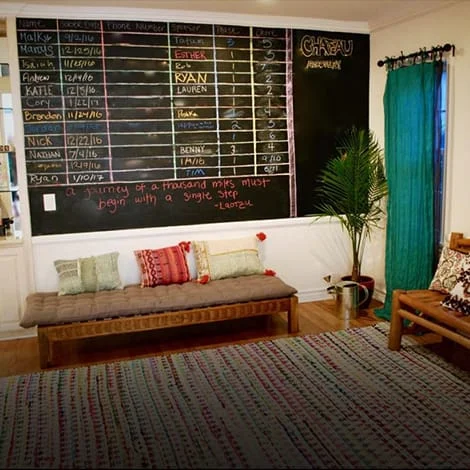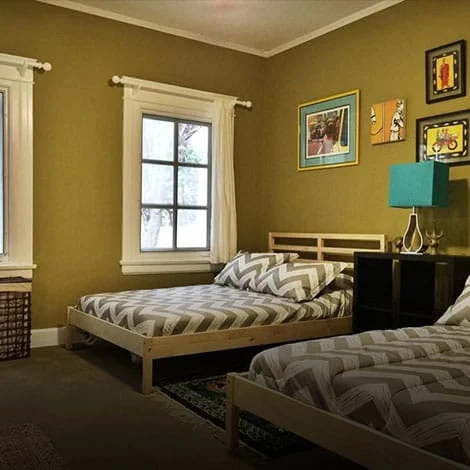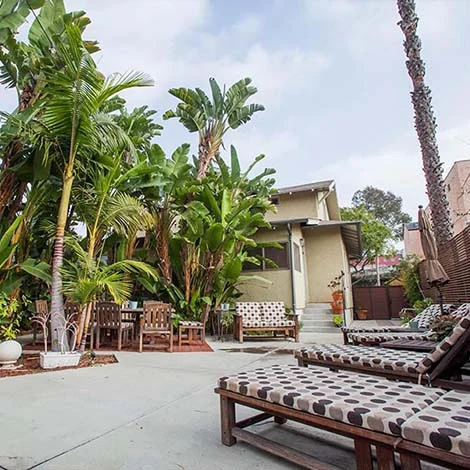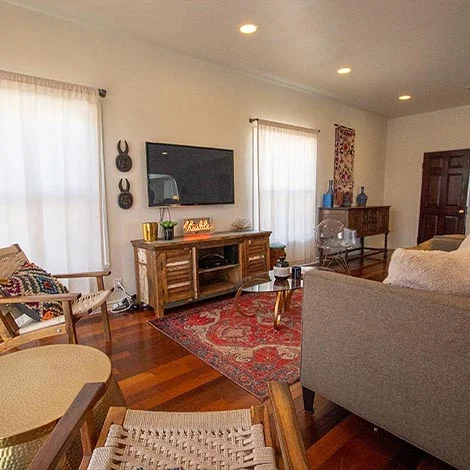Westwind Recovery®® provides supportive, comfortable, relaxed, and convenient environments for our residents. The sober living programs in Los Angeles help to rediscover life and passions during sobriety. Each of our world-class, structured sober living homes promotes healthy and happy recovery through supportive care, services, and amenities, such as:
- Private and semi-private rooms
- Flat-screen or plasma TVs with premium cable and AppleTV
- Netflix, HBO, Showtime, and Hulu Plus
- Pool and hot tub
- High-speed Wifi
- Fully equipped kitchens with modern appliances
- Free access to washer and dryer
- 24/7 Live-in Management for extra support and structure
- Weekly Outings – Hikes, Beach, Movies, etc.
- Free standard supplies (i.e. toilet paper, paper towels, laundry supplies)
- Convenient and easily accessible parking
- Patios or backyards
- Storage space for bicycles, golf clubs, surfboards, and other equipment
- Unlimited coffee
- Pet-friendly sober living spaces
- Rides provided to meetings daily
- Food Staples provided for free
Westwind Recovery®’s Southern California Sober Living Homes
Here at Westwind Recovery®, we strive to ensure that our clients have everything they need in order to recover from drug and alcohol addiction. We understand that the recovery process comes with many challenges and difficulties. Individuals who are working on becoming and staying sober typically face obstacles along the way. But our mission is to make the recovery journey both smooth and successful. One of the ways in which we do this is by providing a sober living program here in California. As a trusted treatment center for dual diagnosis, we also ensure that individuals facing both substance use and mental health conditions receive the comprehensive care they deserve.
What is a Sober Living Home?
A sober living home is a facility that offers people a place to live and receive support after drug or alcohol addiction treatment. During rehab, individuals tend to have ongoing guidance. Programs such as inpatient treatment or residential treatment including options like luxury rehab LA and holistic rehab Los Angeles, provide access to a support system.
An intensive outpatient program or an outpatient treatment program can also provide the necessary support. But, the need for encouragement and accountability does not go away after substance abuse treatment is over. This is where a sober living facility can help.
While in a sober living home, individuals can continue to receive the help they need, whether they are in early recovery or they are further along in their journey. Structured sober living houses facilitate recovery, providing people with the tools they need in order to achieve long-term recovery and sobriety.

Often, people confuse sober living homes with halfway houses. While the two are certainly similar, it is important to note that there are some differences. A sober living home is typically privately owned or they are owned by addiction treatment facilities. A halfway house is typically owned by the state.
Halfway houses may be court-mandated for individuals who are coming from a correctional facility. On the other hand, sober living homes provide housing for people who are coming from a substance abuse rehab program.
Also, while people who are residing in a sober living home are likely continuing their treatment and recovery process (i.e. attending addiction therapy, going to recovery group meetings, etc.), people living in halfway houses may not be doing so.
A sober living program can be helpful for individuals in various chapters of the addiction recovery process. A person may be a good candidate for a sober living house if they:
- Have completed a residential program for substance abuse
- Have completed an outpatient program for substance abuse
- Would benefit from living in a substance-free home
- Need continued support after finishing addiction rehab
- Desire a space place after treatment to prepare to return home
- Have experienced relapse and need help using relapse prevention techniques before returning home
- Would like to establish a more solid foundation as they transition from life in rehab
As people prepare to live a new life after substance abuse, it is important for them to have the best support system possible. Thankfully, a sober living home can provide this.
Individuals who live in a sober living house may be subject to random drug tests and alcohol tests. They also cannot be involved in violence or illegal activities. In some sober homes, residents must attend school, have a job, or attend an outpatient rehab program.
Benefits of Sober Living Facilities
There are many benefits to living in a sober home. Some of the advantages of structured sober living homes include the following:
- Life skill development
- Relapse prevention skill development
- Opportunity to gain employment after rehab
- Around-the-clock access to care
- Development of healthy habits
Here at Westwind Recovery®, our southern California sober living facilities can help you lead a healthy lifestyle after treatment. Residents of our sober homes can find the structure, support, and guidance they need to live healthy lives, free from drugs, alcohol, and the negative effects of substance abuse.
By living with peers and members of the recovery community, recovering addicts can develop positive relationships with others as they transition back into the world outside of treatment. Finding a community that facilitates this transition can make all the difference when it comes to living beyond addiction.
So, if you’ve been looking for sober living opportunities in or near the beautiful city of Los Angeles, look no further. Westwind Recovery® is here for you!
How to Find a California Sober Living Home for Your Needs
If you are looking for a sober living house, you can find one that works for you by speaking with your substance abuse rehab center. They can help direct you to a sober home in your area that provides the type of support and housing you need. You can also get a referral from a therapist, fellow recovery group participants, and so forth.
Fortunately, we have multiple sober living locations. We can make sure that, once you finish treatment, you can safely transition with the help of one of our luxurious sober houses.
Contact Us Today to Learn More
To learn more about our California sober living homes, reach out to us today. Our Los Angeles recovery community is here to help you overcome substance use disorders once and for all. Become one of our residents and pursue the long-term sobriety you’ve been desiring. We’re standing by for your call!

Dr. Deena is the Chief Clinical Officer of Westwind Recovery®, an award-winning outpatient treatment center in Los Angeles where she oversees the clinical and administrative program and treatment methods. Dr. Deena is a doctor of psychology and licensed clinical social worker since 1993. LCSW #20628. Originally from the East Coast, Dr. Deena has worked running treatment centers, worked as a therapist in psychiatric hospitals as well as school settings and currently has a thriving private practice in the LA area. Dr. Deena has appeared regularly on the Dr. Phil Show as an expert since 2003. She has also been featured on many other TV shows, podcasts and has contributed to written publications as well as podcasts.













